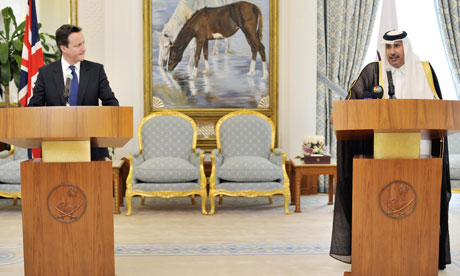According to the latest news reports, over two million Egyptians have taken to the streets of Cairo to demand Mubarak's resignation (
Al-Arabiya,
YNet,
Al-Jazeera,
HaAretz). That number is probably inflated, but just a few weeks ago no one could have imagined protests even with just a few hundred people, let alone hundreds of thousands as there are now. With the Army's public statements of sympathy for the protestors and their outright refusal to respond with violence, Mubarak's options are quickly dwindling.
Mubarak's best hope for saving face would be to negotiate gradual reforms until new elections, which are scheduled to take place in September anyway (he's already trying to work this in:
Haaretz,
Reuters). But this seems very unlikely at this point. Most Egyptians would fear that he would use the intermediate period of calm to regain his hold on power.
It seems that at this point, Mubarak's only chance for a somewhat graceful exit is to appoint an interim President - be it Mohammad El-Baradei or Ahmed Zewail or even respected but heretofore unknown judge - and agree to resign. The protest movement will not accept anything less than his resignation and at least in this way Mubarak can appear to be working with the Egyptian people. However, this scenario is also very unlikely since Mubarak would likely have to go into exile to avoid the inevitable charges of treason and crimes against humanity that would be brought against him by the new government.
Then how is this going end? There are a few possibilities.
1. Like in Tunisia, Mubarak may eventually realize that his grip on power is unrecoverable and decide that exile is preferable to death. This is the best case scenario. The door would then be open for El-Baradei or Zewail or another opposition figure to take the reigns and oversee a transition towards real elections.
2. Mubarak may make one last play for power and order police and army contingents that are still loyal to him to open fire on the crowds. This however is a double edged sword: people will either be too intimidated to keep protesting and go home until September or they will be so angry that the protests will swell even larger and become violent.
3. Ambitious army officers may exploit the situation to stage a coup "on behalf" of the people and arrest Mubarak. While this technically could lead the way to a military backed democratic government, given the history of coups in the Middle East in general and Egypt in particular, it doesn't seem so likely this would be a step towards a more democratic Egypt. If one wants to take a more optimistic view, a coup could possibly just be a front for an interim government until new elections can be held. But coups are risky and people usually only engage in them when they will directly benefit from them (i.e. be the new president) so I wouldn't hold out too much hope for this option.
4. The least likely option and by far the worst: I wouldn't mention it at all except, sadly, it is being peddled on all the conservative radioshows and of course Fox News. The Muslim Brotherhood could exploit the situation, rise to the fore of the protests and win the new elections. Like I've said before, as much as we don't want Egypt to be the next Iran, the Egyptians want it even less. While the Brotherhood has been part of the protests, they have been on the periphery, not the center and their popularity is nothing close to what Mubarak claims. They are his go to boogeyman and like most boogeymen, once you shine a light under the bed, you'll find the stories you've heard about them don't match reality.
(from
designyoutrust.com, perfectly sums up why Egyptians don't want to follow in Iran's footsteps)
Whichever one of these options comes to pass, the fact remains that something needs to change soon. Eventually people are going to need to go back to work, buy food and feel a general sense of security and none of that can happen while the country is rising in revolt. That is all the more reason to hope that Mubarak steps down soon so the protests don't take a more violent turn as they get more desperate.





















